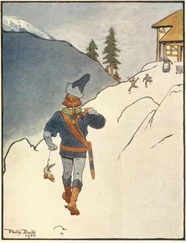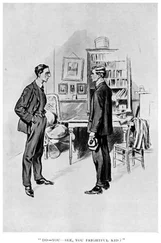Pelham Wodehouse - Spring Fever
Здесь есть возможность читать онлайн «Pelham Wodehouse - Spring Fever» весь текст электронной книги совершенно бесплатно (целиком полную версию без сокращений). В некоторых случаях можно слушать аудио, скачать через торрент в формате fb2 и присутствует краткое содержание. Жанр: Классическая проза, Юмористическая проза, на английском языке. Описание произведения, (предисловие) а так же отзывы посетителей доступны на портале библиотеки ЛибКат.
- Название:Spring Fever
- Автор:
- Жанр:
- Год:неизвестен
- ISBN:нет данных
- Рейтинг книги:3 / 5. Голосов: 1
-
Избранное:Добавить в избранное
- Отзывы:
-
Ваша оценка:
- 60
- 1
- 2
- 3
- 4
- 5
Spring Fever: краткое содержание, описание и аннотация
Предлагаем к чтению аннотацию, описание, краткое содержание или предисловие (зависит от того, что написал сам автор книги «Spring Fever»). Если вы не нашли необходимую информацию о книге — напишите в комментариях, мы постараемся отыскать её.
Spring Fever — читать онлайн бесплатно полную книгу (весь текст) целиком
Ниже представлен текст книги, разбитый по страницам. Система сохранения места последней прочитанной страницы, позволяет с удобством читать онлайн бесплатно книгу «Spring Fever», без необходимости каждый раз заново искать на чём Вы остановились. Поставьте закладку, и сможете в любой момент перейти на страницу, на которой закончили чтение.
Интервал:
Закладка:
Nothing, in his opinion, could actually convert his employer into an oil painting, but the blue suit and the heliotrope shirt might help to some small extent.
3
Some four and a quarter hours after a silver-voiced Western Union songster, even more of a human nightingale than usual owing to sucking throat pastilles, had chanted into the receiver of his telephone that beautiful lyric which begins:
Happy birthday to you,
Happy birthday to you,
and goes on (in case the reader has forgotten):
Happy birthday to you,
Happy birthday to you.
Claude Percival John Delamere Cobbold, the fifth Earl of Shortlands, was standing at the window of his study on the ground floor of Beevor Castle in the county of Kent, rattling in his trousers pocket the two shillings and eightpence which was all that remained of his month's pocket money and feeling how different everything would be if only it were two hundred pounds.
The sun which had evoked the enthusiasm of Augustus Robb in London at eleven o'clock was shining with equal, or even superior, radiance on Beevor Castle at eleven-fifteen. It glittered on the moat. It also glittered on the battlements and played about the ivied walls, from the disused wing which had been built in 1259 to the modernized section where the family lived and had their being. But when a couple of rays of adventurous disposition started to muscle into the study, they backed out hastily at the sight of this stout, smooth-faced man who looked like a discontented butler, finding his aspect forbidding and discouraging.
For the morning of May the twelfth, the fifty-second anniversary of his birth, had caught Lord Shortlands in poor shape. A dark despondency had him in its grip, and he could see no future for the human race. He glowered at the moat, thinking, as he had so often thought before, what a beastly moat it was.
As a matter of fact, except for smelling a little of mud and dead eels, it was, as moats go, rather a good moat. But you would have been wasting your time if you had tried to sell that idea to Lord Shortlands. A sullen dislike for the home of his ancestors and everything connected with it had been part of his spiritual make-up for some years now, and today, as has been indicated, he was in the acute stage of that malady which, for want of a better name, scientists call the heebie-jeebies.
It generally takes a man who likes to sleep till nine much more than four and a quarter hours to recover from the shock of having "Happy birthday" sung to him over the transatlantic telephone at seven, and in addition to this shattering experience there had been other slings and arrows of outrageous Fortune whistling about the fifth earl's ears this morning.
His dog Whiskers was sick of a fever. His favourite hat, the one with the broken rim and the grease stains, had disappeared, stolen, he strongly suspected, by his daughter Clare, who was collecting odds and ends for the vicar's jumble sale. Breakfast, in the absence of Mrs. Punter, the cook, away visiting relatives in Walham Green, had been prepared by the kitchenmaid, an indifferent performer who had used the scorched-earth policy on the bacon again. Cosmo Blair, the playwright, who had been staying at the castle for the past week, much against his lordship's wishes, was extending his visit indefinitely, in spite of the fact that there had been a clean-cut gentleman's agreement that he would leave this afternoon.
And, shrewdest buffet of all, his daughter Adela, a woman who, being the wife of Desborough Topping, one of those Americans at the mention of whose name Bradstreet raises his hat with a deferential flourish, could have fed such sums to the birds, had refused to lend him two hundred pounds.
Wanted to know why he wanted two hundred pounds, of all silly questions. As if he could possibly tell her that he wanted it in order to buy a public house and marry Mrs. Punter, the cook.
What the average rate or norm of misfortune for earls on their birthdays might be Lord Shortlands did not know, but he would have been greatly surprised to discover that he had not been given an unusually liberal helping; and he was about to sink for the third time in a sea of self-pity when he became aware of a presence and, turning, saw that his daughter Clare had entered the room.
Self-pity gave way to righteous wrath. There are men from whom old hats can be snitched with impunity, and men from whom they cannot. Lord Shortlands was a charter member of the second and sturdier class. His
prominent eyes glowed dangerously, and he spoke in a voice the tones of which King Lear, had he been present, would have memorized for personal use.
"Clare," he boomed, "did you take that hat of mine?"
She paid no attention to the question. She was a girl who had an annoying habit of paying no attention to questions, being brisk and masterful and concentrated on her own affairs; the sort of girl, so familiar a feature of the English countryside, who goes about in brogue shoes and tweeds and meddles vigorously in the lives of the villagers, sprucing up their manners and morals till you wonder that something in the nature of a popular uprising does not take place. The thought sometimes crossed Lord Shortlands' mind that if he had been a villager compelled to cope with Lady Clare Cobbold and her sister Lady Adela Topping, he would have turned his face to the wall and given up the struggle.
"Whose is this, Father?" she asked, and he saw that she was extending towards him a battered volume of some kind. It might have been, as indeed it was, an album for the reception of postage stamps.
It is interesting to reflect that this stamp album, which was to play so considerable a part in Lord Shortlands' affairs, made upon him at its first introduction but a slight impression. It was to be instrumental before the week was out in leading him to break Commandments and court nervous prostration, but now he merely looked at it in distaste, like a butler inspecting a bottle of wine of an inferior vintage. Coming events do not always cast their shadows before them.
"Don't point that beastly thing at me," he said. "It's all over dust. What is it?"
"A stamp album."
"Well, it's caked with grime. Put it on the table. Where did you get it?"
"I found it in a cupboard," said Clare, deviating from her practice of not answering questions. "Whose is it, do you know? Because if it doesn't belong to anyone, I want it for my jumble sale."
This would have been an excellent cue for the restating of the hat motif, but Lord Shortlands had now begun to be interested in this album. Like most people, he had once collected stamps, and strange nostalgic emotions were stirring within him. He approached the table and gave the book a tentative prod with the tip of his ringer, like a puppy pawing at a tortoise.
"Why, this is mine."
"Why should it be yours?"
"I used to collect stamps."
"I should imagine it's Tony's."
"Why should it be Tony's any more than mine?"
"I've told Desborough, and he's coming here to look through it. He knows all about stamps."
This was true. A confirmed philatelist from his early years, Desborough Topping was as much looked up to by Stanley Gibbons as by Bradstreet. Stamps and the reading of detective stories were his two great passions.
"There may be something valuable in it. If there is," said Clare, who, while she believed in supporting jumble sales in aid of indigent villagers, did not believe in overdoing it, "we can take it out."
She moved towards the door, and Lord Shortlands remembered that the vital issue was still unsettled.
"Just a minute. How about that hat? Somebody has taken my hat. I left it last night hanging on a peg in the coatroom. I go there this morning, and no hat. Hats don't run away. Hats don't leap lightly off pegs and take to the great open spaces. Have you seen my hat?"
Читать дальшеИнтервал:
Закладка:
Похожие книги на «Spring Fever»
Представляем Вашему вниманию похожие книги на «Spring Fever» списком для выбора. Мы отобрали схожую по названию и смыслу литературу в надежде предоставить читателям больше вариантов отыскать новые, интересные, ещё непрочитанные произведения.
Обсуждение, отзывы о книге «Spring Fever» и просто собственные мнения читателей. Оставьте ваши комментарии, напишите, что Вы думаете о произведении, его смысле или главных героях. Укажите что конкретно понравилось, а что нет, и почему Вы так считаете.


